Lily And The Octopus
Steven Rowley
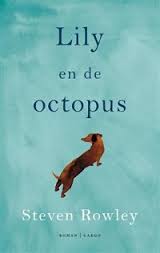 Steven Rowley tells us about his close relationship with his dog Lily and how a tumor on her head eventually took her life. He's was offered one million dollars to write a cathartic book about the experience on spec. Not bad for his first major published novel.
Steven Rowley tells us about his close relationship with his dog Lily and how a tumor on her head eventually took her life. He's was offered one million dollars to write a cathartic book about the experience on spec. Not bad for his first major published novel.
Lily and the Octopus is Steven Rowley's first book. He explains that he did write the book first, without any offers. However, after his publisher read it, they were quite generous with him. Steven thinks it is amazing and something like a Cinderella story the way it took place.
While his book is very much a novel, he did have a Dachshund named Lily, who he had since she was a puppy until the age of 13 when she succumbed to cancer.
After Lily's passing, he sat down and wrote about his experiences with her, never expecting it to turn into a published novel. He wrote it to help him heal and understand his loss. He tried to be as emotionally true as to what he was feeling and somehow that seems to be resonating with readers.
The octopus in the story is metaphorically a tumor. Lily had a little lump above one of her eyes that started to grow, which lead Steven to think of it is an octopus which had a hold of her. Unfortunately, it was fast growing brain tumor and it was only a couple of months from the time it was diagnosed to the end of her life.
When Steven sat down to write, his goal was to write about attachment and loss. There was something about the metaphor of an octopus, which has tentacles and can have sort of a literal stranglehold on you and how hard it can be to let go when it's time.
While Lily and the Octopus is a book about grief, it is not without humor and celebration of life and our relationships with our pets.
Steven had dogs growing up while living in rural Maine. However, when he grew up in the 70's, relationships at that time with our pets were different from what they are now. Dogs back then were mostly outdoor pets. Lily was the first dog that Steven raised from puppyhood and who also was very much a family member to him.
 Steven currently has a new rescued dog named Tilda, who is a terrier mix. When it came time to getting another dog, he had a good home and felt that not providing a home to another dog in need was selfish. He felt was ready to open his house and his heart to a new dog. Tilda had rough beginnings and was shot up pretty badly with a BB Gun. She lost one eye and had several broken ribs so she was also ready for a safe place to live. While she was not quite so ready to trust another person, after a delicate dance between her and Steven, they became good friends.
Steven currently has a new rescued dog named Tilda, who is a terrier mix. When it came time to getting another dog, he had a good home and felt that not providing a home to another dog in need was selfish. He felt was ready to open his house and his heart to a new dog. Tilda had rough beginnings and was shot up pretty badly with a BB Gun. She lost one eye and had several broken ribs so she was also ready for a safe place to live. While she was not quite so ready to trust another person, after a delicate dance between her and Steven, they became good friends.
Steven admits that it was hard to get another dog and his biggest fear is that she might be too much like Lily, which he would resent her for, or what if she was not at all like Lily and he had trouble attaching to her. But as Steven admits, each relationship with a dog is unique and provides its own love.
So what would he say to someone who recently lost an animal and is not sure about getting another one? Steven states that people who love animals have a special bravery. These people love their animals fully knowing that they don't live as long as we do, but we love them fully anyway. We lose them, we grieve. Many of us then get to the back of the line and sign up to do it all over again. He says this is a special kind of human being. That is his tribe and the people he love.
Follow Steven Rowley on Twitter and Instagram.
1st Ever U.S. Cloned Puppy
Blake Russell, ViaGen Pets
 Top Dog at ViaGen Pets, Blake Russell, is here to announce the birth of the first-ever cloned puppy here in the United States. While the dog is being weaned, the new guardian is watching the pup via the Internet.
Top Dog at ViaGen Pets, Blake Russell, is here to announce the birth of the first-ever cloned puppy here in the United States. While the dog is being weaned, the new guardian is watching the pup via the Internet.
Most people aren't even aware that companion animal cloning is available in the United States, so this puppy is going to get the opportunity to tell the world that cloning technology is available for pet owners everywhere.
The puppy is a Jack Russell, who had an owner who believes that she was the dog of a lifetime. The owner had a phenomenal relationship with her, and now that she is getting older, he saw the opportunity to produce an identical twin to this lifetime treasure. It is also a chance to extend this bond that he had with her.
The gentleman is anxiously awaiting her, as she cannot be taken from her mother until she is weaned, which is a few weeks away. He is watching her on video and communicating with her every day.
Blake tells us that they have a waiting list that's been building as word gets out. They are just now getting the word out to veterinarians and pet owners, not only around the United States, but also all over, that puppy and kitten cloning is available in the United States.
It is not as complicated as it sounds. Blake explains that their team of scientists makes it very simple for clients. A client just takes their pet to a veterinarian who does a simple skin biopsy and ViaGen does the rest.
At the end of the day, a client gets a 100-percent guarantee that they will have a healthy, veterinarian inspected, genetic match or identical twin to their dog or cat.
Blake tells us that there is no genetic modification done and that they get an identical twin, so the clone will have the same exact genetics as the original.
If you're not ready to clone, but are thinking about it, you can take the first step, which is genetic preservation. You can then store your pet's DNA indefinitely while you decide.
To learn more, visit ViaGenPets.com or call 888-876-6104.
Eliminating Fear of Vet Visits
Dr. Marty Becker
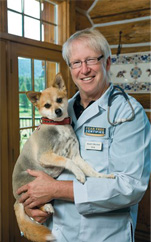 Going to the vet can be a traumatic experience for your pet. Following Animal Radio Veterinary Correspondent, Dr. Marty Becker's instructions can make the vet actually a fun place to go. We call it Fear Free Visits.
Going to the vet can be a traumatic experience for your pet. Following Animal Radio Veterinary Correspondent, Dr. Marty Becker's instructions can make the vet actually a fun place to go. We call it Fear Free Visits.
We love our animals and we do some crazy things for them. But, there are also some not-so-crazy things we can do for them.
For example, when it comes to vet visits, you need to take the 'pet' out of 'petrified.' So what does this mean? Think about when you're looking at your pet. You can tell when they're calm and happy and relaxed. This can be when they are getting a treat or just sitting quietly by your side. Next, look at the times when they are fearful and stressed. This may happen when they come across an unfamiliar dog on their walk or it may be a trip to a veterinarian.
Most animals know when it's time to go to the vet's. They may see you get the carrier out or they may read your body language, they may even know the route you drive to take them there.
There are a lot of things vets have learned on creating fear-free vet visits that pet owners need to be aware of.
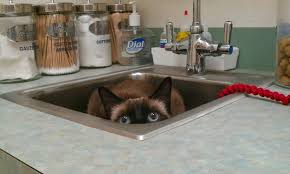 There are certain anxiety and fear triggers that are part of taking your pet to the vet. So if you have a small dog or cat and you're going to use a carrier, don't get it out the night before or the morning of the visit. If you do, you are guaranteed to have a pet that is going to have instant anxiety that lasts throughout the trip and even the actual visit.
There are certain anxiety and fear triggers that are part of taking your pet to the vet. So if you have a small dog or cat and you're going to use a carrier, don't get it out the night before or the morning of the visit. If you do, you are guaranteed to have a pet that is going to have instant anxiety that lasts throughout the trip and even the actual visit.
The ideal thing to do is to leave the carrier out all of the time. If you hate the idea of leaving one of those plastics crates lying around, there are now many designer carriers that aren't eyesores and can look like cool pet furniture. To make the space desirable for your pet, put new toys in the carrier or even treats. Be sure to let any children know that that is a safe place for their pet and they shouldn't bother them while they are in there.
If your pet is going in for a wellness visit, you need to prepare a week out. This will involve the use of pheromones. You should get a recommendation from your veterinarian for a brand, as many of them look the same but don't work the same.
These pheromones can be sprayed on a towel or pad in the carrier. You can also spray them in your car just before a vet trip. Your vet clinic should also be using them.
There are also some natural "chill pills," or even pressure garments like ThunderShirt. You need to also start the chill pills about a week prior to a vet visit.
When it actually comes time to take your pet to the vet, don't do it with dread. Put on your "happy voice" and make it sound like it will be fun. You want your pet hungry, so you might think about not feeding them the night before the visit.
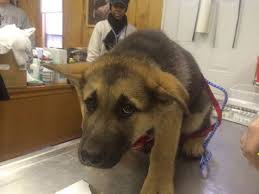 Depending upon the weather, you might need to pre-cool or pre-heat the car before you put your pet in it.
Depending upon the weather, you might need to pre-cool or pre-heat the car before you put your pet in it.
When you place your pet in the car in a carrier, place them in the backseat on the floor or the very back if you have a SUV. You should also cover them with sheet or towel to reduce visual stimuli.
You might even want to go on iTunes and download songs from either Through A Dog's Ear or Through a Cat's Ears, which is calming music specifically for an animal.
Next, DON'T baby talk your pet on the drive to the vet.
If you do these things: bring it hungry; start the pheromones and chill pills a week out; play music on the car; don't use baby talk to them; and cover their carrier, you are going to arrive at the vet office with a pet that seems like they've had three glasses of wine and a valium!
Dr. Becker has been practicing veterinary medicine for more than 30 years and is a best-selling author, syndicated columnist and a frequent guest on national shows. You can also find Dr. Becker on Vetstreet.com, a new animal health and lifestyle website dedicated to giving pet owners the most accurate information possible to keep their pets healthy and happy. Follow Dr. Becker on Facebook and Twitter.
http://www.drmartybecker.com
 E-Cigarette Toxicity in Pets -Dr. Debbie
E-Cigarette Toxicity in Pets -Dr. Debbie
Think that vapor cigarettes (a.k.a. electric cigarettes or e-cigarettes) are a healthier alternative to traditional cigarettes? The vapor habit might be better for you and decrease your pet's exposure to second hand smoke, but can increase the chance of a pet's toxic ingestion of nicotine. A recent story from England told of the tragic death of a puppy that died after chewing on an e-liquid container.
Ivy was a 14 week on Staffordshire Bull Terrier that chewed on her owner's bottle of e-liquid used to refill the electric cigarettes. Within 30 seconds of nibbling on the container, she fell sick with vomiting and disorientation and was rushed to a veterinary office. Sadly Ivy died within 24 hours due to heart and respiratory failure.
What's in e-liquid?
The ingredients in e-liquid vary but include carriers such as propylene glycol, polyethylene Glycol 400 and vegetable glycerin, as well as flavoring agents and nicotine. The amount of nicotine in e-liquid varies with some products not containing any nicotine, to others ranging from 18 mg/ml to 100mg/ml.
How toxic is nicotine?
The toxic dose of nicotine for pets is 0.5 to 1mg per pound of body weight. The fatal dose is 4mg per pound. So if you consider a 20 pound dog, toxicity would occur if 10mg were ingested, and the pet would die if 80mg were ingested. Therefore with the high nicotine levels in e-liquid, it wont take much to reach those fatal levels. That hypothetical 20 pound dog could die from less than 1ml of the highest potency liquid nicotine.
Pets likewise can develop toxicity if other sources of nicotine are ingested such as cigarettes, chewing tobacco, nicotine gum, or nicotine nasal sprays. The typical amounts of nicotine in these products are: Cigarette 9-30 mg; Nicotine gum 2 - 4 mg per pieces; and Nicotine patches 8.3 - 114 mg.
 Even cigarette butts can be toxic if enough are ingested - cigarette butts retain 25% of the nicotine in the original cigarette.
Even cigarette butts can be toxic if enough are ingested - cigarette butts retain 25% of the nicotine in the original cigarette.
What are symptoms of nicotine poisoning?
Symptoms usually develop within one hour of ingestion. Pets may display excitability, rapid heart rate, drooling, vomiting, diarrhea, weakness, seizures and coma.
How are pets treated for nicotine toxicity?
The first step is to decontaminate by inducing vomiting. Nicotine typically causes vomiting when ingested, but further decontamination is advised at the veterinary office. Other emergency care includes intravenous fluids, medications to manage elevated blood pressure and heart rate, and anti-seizure medications. Nicotine is metabolized by the liver and excreted within 16 hours after ingestion. Pets that survive the initial four hours after ingestion have a favorable chance of survival.
The vapor cigarette trend is becoming more popular world wide. It's important to recognize that nicotine is a toxin and poisonous to animals and children. Consider the e-liquid a hazardous material and store it safely in a locking cabinet, away from children and pets.
To read more about Ivy's toxicity after ingesting e-fluid go to "Dog dies after chewing e-fluid container."
Featured veterinarian known as "Dr. Debbie" on national pet radio program, Animal Radio. Ebook author of "Yorkshire Terriers: How to Be Your Dog's Best Friend"; "Pugs: How to Be Your Dog's Best Friend"; "Mini Schnauzers: How to Be Your Dog's Best Friend"; and "Shih Tzu: How to Be Your Dog's Best Friend."
http://www.drdebbie.net
5 Reasons Birds Make Incredible Pets
Robert Semrow, Animal Radio Listomania
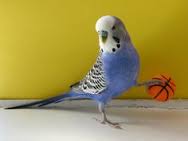 It's no secret that birds are intelligent and are increasingly becoming popular as pets and companions. Those who have had the privilege and joy of having a bird as a companion will sing their praises if given a chance. I thought I'd share 5 reasons birds make great pets:
It's no secret that birds are intelligent and are increasingly becoming popular as pets and companions. Those who have had the privilege and joy of having a bird as a companion will sing their praises if given a chance. I thought I'd share 5 reasons birds make great pets:
To begin with, birds are very intelligent. They are able to learn from, bond with and interact with their owners. They are playful and maybe most endearingly can greet you with the actual words like, "Hello Rob, How was your day?" When was the last time your dog or cat spoke to you in actual words, made uncanny remarks at the most perfect time and carried on actual conversation with you? Ok, maybe the conversations are a bit repetitive, but still, how great is it to hear your pet say "I love you!"
Next up is the advantage that they are easy to care for. They require minimal grooming and are naturally very clean and hygienic animals. They take pride in themselves and will preen themselves daily to keep their feathers shiny and clean. They require little space; little food and can get by with a little time when time is short in supply. It is also easier to clean a cage once a day than multiple clean ups for dogs and cats.
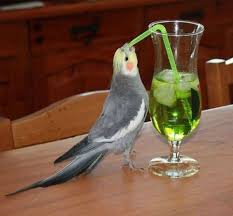 Another advantage is that they do not need much space to live in. While a bird cage with more space is always more desirable, many get by with minimal space. If you are someone who doesn't have a lot of space or a lot of time, a bird may be a perfect pet for you. Bird toys are also another easy thing to provide for them. Birds are able to make almost anything in to an item of interest and play.
Another advantage is that they do not need much space to live in. While a bird cage with more space is always more desirable, many get by with minimal space. If you are someone who doesn't have a lot of space or a lot of time, a bird may be a perfect pet for you. Bird toys are also another easy thing to provide for them. Birds are able to make almost anything in to an item of interest and play.
Next, birds are fairly easy to train. Their intelligence and curiosity make them willing, eager and very capable learners. They do love to interact and please, combining all of this makes them much easier to become well-trained and extremely entertaining members of the family. Remember that birds are beautiful and have different features and habits that will certainly keep you entertained and engaged for a very long time.
Next up is that they also don't eat as much as other pets. They literally eat like birds. In addition to pellets, seed and other prepared bird foods, many birds enjoy appropriate fruits and vegetables. This leads us to the importance of knowing what things can be toxic to them as they and their systems are much smaller and more susceptible.
Finally, most birds stick to a regular schedule that when followed, provides predictability and a healthy environment for you and your bird. So if you are thinking about a bird as a pet, do your research and know that you are possibly making one of the best friends you'll ever have.
Share your pet bird stories on our Animal Radio Facebook Page.
http://petworldinsider.com
Lucy Pet Foundation
The Mission of The Lucy Pet Foundation is to reduce pet overpopulation and the euthanasia of over 80,000 cats and dogs per week in the United States by having mobile spay/neuter clinics across the country and to support causes that benefit animal welfare. The Lucy Pet Foundation currently has two buses that travel around Southern California focusing on spaying and neutering. These buses are state of the art surgery units. Their next focus is in generating more funds to expand the work of these buses and have more across the country.
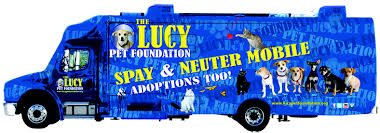 The Lucy Pet Foundation not only offers free and reduced spays and neuters, they also do microchipping, vaccines and de-wormings. Spaying and neutering is not only great for pet population control, but it has been proven that an animal will live on an average of 40-percent longer after having this surgery.
The Lucy Pet Foundation not only offers free and reduced spays and neuters, they also do microchipping, vaccines and de-wormings. Spaying and neutering is not only great for pet population control, but it has been proven that an animal will live on an average of 40-percent longer after having this surgery.
Upcoming Clinics
Free Spay & Neuter for Los Angeles City Residents! Here is a list of upcoming free or reduced fee mobile spay and neuter clinics in California:
Call for more information, questions and to reserve space to get on the list: (855) 499-5829
August 16: East Valley Shelter, 14409 Vanowen St., Van Nuys, CA Spay/Neuter APPOINTMENT ONLY; Vaccine Clinic 10:00am-2:00pm
August 18, 31: Food 4 Less, 1748 West Jefferson Blvd., Los Angeles, CA Spay/Neuter APPOINTMENT ONLY; Vaccine Clinic 10:00am-2:00pm
August 20, 25: Superior Store, 3480 S. La Brea, Los Angeles, CA Spay/Neuter APPOINTMENT ONLY; Vaccine Clinic 10:00am-2:00pm
August 21: Superior Store, 133 West Avenue 45, Los Angeles, CA Spay/Neuter APPOINTMENT ONLY; Vaccine Clinic 10:00am-2:00pm
August 24: Food 4 Less, 5100 N. Figueroa St., Los Angeles, CA Spay/Neuter APPOINTMENT ONLY; Vaccine Clinic 10:00am-2:00pm
August 27: Superior Store, 10211 Avalon Blvd., Los Angeles, CA Spay/Neuter APPOINTMENT ONLY; Vaccine Clinic 10:00am-2:00pm
August 28: ANGEL HANZ FOR THE HOMELESS, North Hollywood Park, 11455 Magnolia Blvd., Spay/Neuter APPOINTMENT ONLY
County and City Vouchers accepted. But remember, you must get on a list to have your pet seen at these locations. Please call The Lucy Pet Foundation toll free at 1-855-499-5829 or Email: Info@lucypetfoundation.org to schedule an appointment, or register at the events.
See the current list of clinics at http://www.lucypetfoundation.org.
Lucy Pet Products, Inc. is a family owned and operated company based in Thousand Oaks, California. Lucy Pet Products are "Products With a Cause." Part of the proceeds from the sales of Lucy Pet Products are used to help fund The Lucy Pet Foundation. Their products can be found in pet specialty stores across the USA and are exported worldwide, or you can visit them at http://www.lucypetproducts.com.
http://www.LucyPetFoundation.org
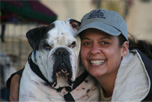 Animal Radio News - Lori Brooks
Animal Radio News - Lori Brooks
First Drug To Treat Canine Noise Anxiety
Fourth of July and all of its noise is gone for this year, but the next biggest noise-making holiday will be New Year's Eve. Hopefully it will be better for the many dogs that are noise sensitive and petrified of all the sounds. But of course there's thunder too, which can happen at any time. It is entirely possible that no one dreads the dog days of summer more than dogs themselves. By some estimates, at least 40-percent of dogs experience noise anxiety. Any vet can tell you about dogs who took refuge in hiding places so tight that they got stuck, who gnawed on door handles, chewed through walls or fences, crashed through windows or raced into traffic. Animal behavior experts who have studied such dogs say, "It's a very serious panic disorder with a complete flight response." Over the years, a variety of remedies for noise anxiety have sprung up such as homeopathic blends, pheromones, CDs of thunderstorms mixed with music, special shirts or jackets, even Prozac and Valium. Last month the FDA approved the first drug to treat canine noise aversion. It's called Sileo. It inhibits nor-epinephrine, a brain chemical associated with anxiety and fear responses. The new drug is actually a micro-amount of a medication approved as a sedative for minor veterinary procedures. It is a flavorless gel measured in a syringe, which is squeezed between the dog's cheek and gum and absorbed within 30 minutes. It was tested on several hundred noise-averse dogs during two years of New Year's fireworks. Seventy-Five percent of the owners rated the dogs' response as good to excellent. The drug lasts several hours, after which another dose can be administered. A syringe costs about $30 and holds several weight-dependent doses. Sileo's main side effect, in about 4 to 5 percent of the dogs, was vomiting. The optimal solution, as Dr. Debbie has said before, is catching the response early and de-sensitizing the dog with calibrated recordings of the offending noise and positive conditioning. By the way, cats can have noise aversion, though reports are less common.
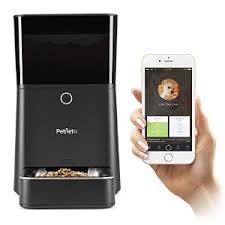 Internet Outage Causes Starving Pets
Internet Outage Causes Starving Pets
The Internet of Things may be touted as the next big thing in technology, but those Internet connected solutions designed to make your life easier can cause huge problems as many pet owners recently found out. PetNet, an internet-connected feeding service, experienced a server outage last week that left many pets hungry for hours and many pet owners very upset! The $149 PetNet system is marketed as, "The world's first intelligent pet feeder that will program itself around your life and the wellness of your pet." The smart feeder manages food supply, timing and even portion size. But because of the server outage, hundreds of pets were not fed. The company put out an email explaining the problem and said, "Please ensure that your pets have been fed manually until we have resolved this issue." Many PetNet users were miffed because apparently they had not realized that the device, which relies on the system's central server to manage and schedule the smart feeders, does not have a backup system to deal with such emergencies. While most were outraged about the outage, some users took it in stride like one guy who posted that he had just manually fed his dog, by pouring kibble in a bowl and setting the bowl on the floor.
 Animal Shelter is Full of Toxic Mold
Animal Shelter is Full of Toxic Mold
A building inspector has evaluated the Martin County Kentucky Animal Shelter and gave them the bad news last week, which is bad news for humans and the animals that have been there. Seems the building is full of toxic mold in the walls and in the ceiling. In order to have it cleaned professionally by special licensed personal, the building has to be evacuated completely. Stray Hearts Animal Rescue, which operates the shelter in Inez, Kentucky, under a county contract, are now scrambling to get at least 20 dogs and 37 cats to a safe place or adopted. On top of that, there's the expense of the mold clean up, plus every single animal has to be vetted before it can leave the building because the black mold can cause neurological damage. If you know anyone in Inez, or Martin County Kentucky, we hope you'll let them know there's a big problem at their local shelter. Of course anyone help by donating. Their Facebook page is Stray Hearts Animal Rescue.
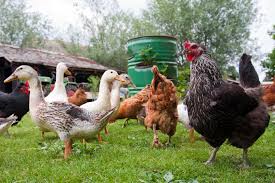 Salmonella Outbreak from Backyard Chickens and Ducks
Salmonella Outbreak from Backyard Chickens and Ducks
More than 600 people have gotten sick so far this year in outbreaks of salmonella, which has been traced to pet chickens or ducks, kept in backyard flocks. Health officials are warning that as tempting as it might be to nuzzle up to a fluffy chick, owners of poultry pets should rein in the affection to protect themselves from illness. Forty-five states have reported outbreaks of salmonella linked to live poultry in backyard flocks this year, according to the CDC. More than 600 people have been infected and about 140 of them had to be hospitalized. So it's pretty serious. The CDC said this is the largest number of illnesses linked to live poultry on record. If you have kids, make sure they are especially careful as one third of infections have been in children under 5 years old. Remember, all live poultry can carry salmonella bacteria, even if they look healthy and clean. Coming in contact with bird droppings can also infect people. But there are steps you can take to avoid illness:
- Don't kiss chickens and ducks or bring them close to the face
- Always wash hands well with soap and water after handling feathered pets
- Don't let live poultry inside the house
- Don't let kids under 5 handle or touch chicks, ducklings, or other live poultry without adult supervision
 Is This the Demise of the Bulldog?
Is This the Demise of the Bulldog?
There's a new study out on what could be the demise of bulldogs. The English Bulldog is one of the most popular breeds in the world because of its child-like appearance and behavior. But the alterations in body type and behavior needed to create the breed we're used to seeing has required many physical changes, way beyond its village dog ancestors of years ago. These changes have occurred over hundreds of years, but have sped up significantly over the last decades. Unfortunately, popularity does not equate to health and there have been increasing pressures on breeders to moderate the extreme physical changes that now affect the breed and its health. However, improving health by breeding in changes that would positively impact the health of bulldogs may no longer be possible. New research shows there is likely not enough diversity in the genes to improve the breed from within, so they should seek to improve the breed by out-crossing to other breeds. The results confirm that the breed has lost considerable genetic diversity from highly focused selection for specific desired physical traits like big heads and loose skin.
Sea World Drops Lawsuit
SeaWorld has requested the dismissal of its lawsuit against the California Coastal Commission challenging conditions placed on its permit to expand tanks at the marine park as part of their Blue World Project. Those conditions required SeaWorld to end its captive breeding and transfer the orcas at the San Diego facility. With SeaWorld's request, the suit is officially dismissed. The Animal Legal Defense Fund says, "Dropping this lawsuit is a positive step toward following through with their promise, but it does nothing for all the other animals SeaWorld holds suffering in captivity."
 Thieves Unknowingly Save Dog From Hot Car
Thieves Unknowingly Save Dog From Hot Car
An unlikely Good Samaritan, who happened to be a smash and grab thief, saved a German Shepherd in the Chicago area from certain death last week. But it's a good thing in this case. It all began when a man left his laptop and his dog, the German Shepherd, locked in his pick-up truck while he went into a local pub. It was super hot that day, but luckily for the dog, a pack of thieves were casing the street for easy to grab loot and spotted the laptop sitting on the truck's passenger seat. They smashed the window, grabbed the laptop and ran off. When the man came out and saw his window and laptop gone he told authorities he maybe left the vehicle for 15 to 20 minutes. The bar owner pulled her security camera video and learned the dog would have been in the truck for an hour with an approximately temperature of 120. The bar owner said she would have smashed the window out herself but she would have done it to get the dog out.
 Listen to the entire Podcast of this show (#871)
Listen to the entire Podcast of this show (#871)



 Steven Rowley tells us about his close relationship with his dog Lily and how a tumor on her head eventually took her life. He's was offered one million dollars to write a cathartic book about the experience on spec. Not bad for his first major published novel.
Steven Rowley tells us about his close relationship with his dog Lily and how a tumor on her head eventually took her life. He's was offered one million dollars to write a cathartic book about the experience on spec. Not bad for his first major published novel.  Steven currently has a new rescued dog named Tilda, who is a terrier mix. When it came time to getting another dog, he had a good home and felt that not providing a home to another dog in need was selfish. He felt was ready to open his house and his heart to a new dog. Tilda had rough beginnings and was shot up pretty badly with a BB Gun. She lost one eye and had several broken ribs so she was also ready for a safe place to live. While she was not quite so ready to trust another person, after a delicate dance between her and Steven, they became good friends.
Steven currently has a new rescued dog named Tilda, who is a terrier mix. When it came time to getting another dog, he had a good home and felt that not providing a home to another dog in need was selfish. He felt was ready to open his house and his heart to a new dog. Tilda had rough beginnings and was shot up pretty badly with a BB Gun. She lost one eye and had several broken ribs so she was also ready for a safe place to live. While she was not quite so ready to trust another person, after a delicate dance between her and Steven, they became good friends. Top Dog at ViaGen Pets, Blake Russell, is here to announce the birth of the first-ever cloned puppy here in the United States. While the dog is being weaned, the new guardian is watching the pup via the Internet.
Top Dog at ViaGen Pets, Blake Russell, is here to announce the birth of the first-ever cloned puppy here in the United States. While the dog is being weaned, the new guardian is watching the pup via the Internet. Going to the vet can be a traumatic experience for your pet. Following Animal Radio Veterinary Correspondent, Dr. Marty Becker's instructions can make the vet actually a fun place to go. We call it Fear Free Visits.
Going to the vet can be a traumatic experience for your pet. Following Animal Radio Veterinary Correspondent, Dr. Marty Becker's instructions can make the vet actually a fun place to go. We call it Fear Free Visits. Depending upon the weather, you might need to pre-cool or pre-heat the car before you put your pet in it.
Depending upon the weather, you might need to pre-cool or pre-heat the car before you put your pet in it. E-Cigarette Toxicity in Pets -
E-Cigarette Toxicity in Pets - Even cigarette butts can be toxic if enough are ingested - cigarette butts retain 25% of the nicotine in the original cigarette.
Even cigarette butts can be toxic if enough are ingested - cigarette butts retain 25% of the nicotine in the original cigarette. It's no secret that birds are intelligent and are increasingly becoming popular as pets and companions. Those who have had the privilege and joy of having a bird as a companion will sing their praises if given a chance. I thought I'd share 5 reasons birds make great pets:
It's no secret that birds are intelligent and are increasingly becoming popular as pets and companions. Those who have had the privilege and joy of having a bird as a companion will sing their praises if given a chance. I thought I'd share 5 reasons birds make great pets:
 Another advantage is that they do not need much space to live in. While a bird cage with more space is always more desirable, many get by with minimal space. If you are someone who doesn't have a lot of space or a lot of time, a bird may be a perfect pet for you. Bird toys are also another easy thing to provide for them. Birds are able to make almost anything in to an item of interest and play.
Another advantage is that they do not need much space to live in. While a bird cage with more space is always more desirable, many get by with minimal space. If you are someone who doesn't have a lot of space or a lot of time, a bird may be a perfect pet for you. Bird toys are also another easy thing to provide for them. Birds are able to make almost anything in to an item of interest and play.  Animal Radio News -
Animal Radio News -  Internet Outage Causes Starving Pets
Internet Outage Causes Starving Pets
 Animal Shelter is Full of Toxic Mold
Animal Shelter is Full of Toxic Mold
 Salmonella Outbreak from Backyard Chickens and Ducks
Salmonella Outbreak from Backyard Chickens and Ducks
 Thieves Unknowingly Save Dog From Hot Car
Thieves Unknowingly Save Dog From Hot Car